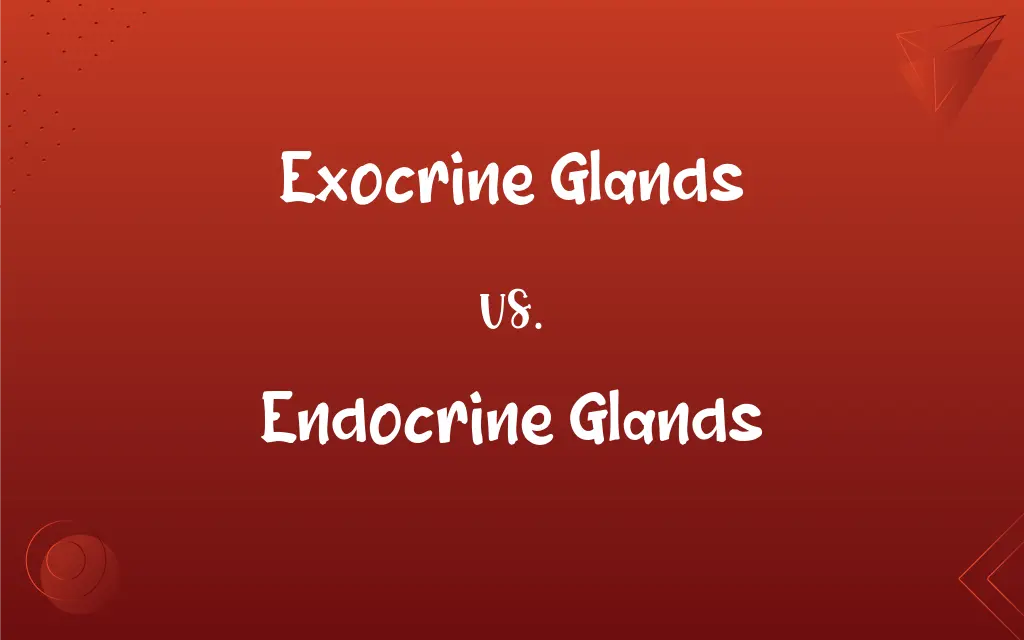Exocrine Glands vs. Endocrine Glands: What's the Difference?
Edited by Janet White || By Harlon Moss || Updated on October 31, 2023
Exocrine glands secrete substances through ducts, like sweat glands. Endocrine glands release hormones directly into the bloodstream, like the thyroid.

Key Differences
Exocrine glands are specialized structures that produce and release their secretions through ducts to the body's external or internal surfaces. Endocrine glands, on the other hand, lack these ducts and directly release their hormones into the bloodstream.
The secretions of exocrine glands can be enzymes, sweat, mucus, or even oil, depending on the gland's function. Endocrine glands, contrastingly, secrete hormones that play crucial roles in regulating metabolism, growth, and many other physiological processes.
A prominent example of exocrine glands includes the salivary glands, which produce saliva released into the mouth. The adrenal glands, an example of endocrine glands, produce hormones like cortisol and adrenaline that directly enter the bloodstream.
While exocrine glands often have localized effects — for instance, sweat glands affecting cooling — endocrine glands have systemic impacts due to the widespread distribution of hormones in the blood. For example, the thyroid gland affects numerous metabolic processes throughout the body.
Both exocrine glands and endocrine glands play indispensable roles in the body's functioning. While exocrine glands deal primarily with immediate and localized responses, endocrine glands are integral for long-term, broad-reaching physiological adjustments.
ADVERTISEMENT
Comparison Chart
Function
Release secretions via ducts
Release hormones directly into the bloodstream
Examples
Salivary glands, sweat glands
Thyroid gland, adrenal glands
Secretions
Enzymes, sweat, mucus, oil
Hormones
Effect
Often localized
Systemic
Presence of Ducts
Yes
No
ADVERTISEMENT
Exocrine Glands and Endocrine Glands Definitions
Exocrine Glands
Exocrine glands are responsible for producing and transporting enzymes or other substances to a surface.
The pancreas, as an exocrine gland, releases digestive enzymes.
Endocrine Glands
Endocrine glands are essential for regulating body processes, from growth to reproduction.
The pituitary, an endocrine gland, releases various hormones for different functions.
Exocrine Glands
Exocrine glands play a role in various bodily functions from digestion to temperature regulation.
Exocrine glands, like the mammary glands, produce milk for nourishment.
Endocrine Glands
Endocrine glands often exert broad, systemic effects on the body.
Endocrine glands like the adrenal release adrenaline affecting multiple systems.
Exocrine Glands
Exocrine glands differentiate from endocrine by their use of ducts for secretion.
While the pituitary is endocrine, the salivary glands are exocrine.
Endocrine Glands
Endocrine glands are ductless organs secreting hormones directly into the bloodstream.
The thyroid, an endocrine gland, releases thyroxine to regulate metabolism.
Exocrine Glands
Exocrine glands cater to localized effects, unlike their endocrine counterparts.
The sebaceous glands in our skin, as exocrine glands, produce oils.
Endocrine Glands
These glands are pivotal in maintaining the body's homeostasis and responding to internal or external changes.
In response to low calcium, the parathyroid, an endocrine gland, releases a regulating hormone.
Exocrine Glands
Exocrine glands are organs that secrete substances externally using ducts.
The sweat glands on our skin are exocrine glands.
Endocrine Glands
Differentiating from exocrine, endocrine glands don't use ducts for their secretions.
The pancreas functions as both exocrine and endocrine, releasing insulin directly into the blood.
FAQs
How do endocrine glands release their secretions?
Endocrine glands release their hormones directly into the bloodstream.
Can you provide an example of an exocrine gland?
Yes, the salivary glands in the mouth are exocrine glands.
What are exocrine glands?
Exocrine glands are organs that secrete substances externally using ducts.
Why do exocrine glands have ducts?
Exocrine glands have ducts to transport their secretions to specific external or internal surfaces.
Are the adrenal glands exocrine or endocrine?
The adrenal glands are endocrine as they release hormones like cortisol directly into the blood.
What role do endocrine glands play in growth?
Endocrine glands release hormones, such as the human growth hormone from the pituitary, crucial for growth processes.
How do endocrine glands help in metabolism?
Endocrine glands, like the thyroid, release hormones that regulate various metabolic processes.
Which gland produces oils for the skin?
The sebaceous glands, which are exocrine glands, produce oils for the skin.
How do endocrine glands influence reproduction?
Endocrine glands, like the ovaries and testes, release hormones that regulate reproductive processes.
How do exocrine glands aid in body cooling?
Exocrine glands like sweat glands release sweat, which evaporates to cool the body.
What is the role of endocrine glands in the body's response to stress?
Endocrine glands, especially the adrenal, release hormones like cortisol and adrenaline, aiding in the body's stress response.
Are sweat glands exocrine or endocrine?
Sweat glands are exocrine glands because they release sweat through ducts.
What's the main difference between exocrine and endocrine glands?
Exocrine glands use ducts for secretion, while endocrine glands release directly into the bloodstream.
Is saliva produced by an exocrine gland?
Yes, saliva is produced by the salivary glands, which are exocrine.
Which endocrine gland is commonly referred to as the "master gland"?
The pituitary gland is often called the "master gland" because it regulates many other endocrine glands.
Do exocrine glands play a role in digestion?
Yes, exocrine glands like the pancreas release digestive enzymes aiding in digestion.
Why are endocrine gland secretions called hormones?
Endocrine secretions are called hormones because they act as signaling molecules, influencing distant organs.
Do exocrine glands always secrete externally?
No, while many exocrine glands secrete externally, like sweat glands, others, like pancreatic glands, secrete into internal cavities or surfaces.
Can a gland function as both exocrine and endocrine?
Yes, the pancreas is an example, functioning as exocrine by producing digestive enzymes and as endocrine by releasing insulin.
How do endocrine glands maintain homeostasis?
Endocrine glands release hormones that regulate and balance various physiological processes, maintaining homeostasis.
About Author
Written by
Harlon MossHarlon is a seasoned quality moderator and accomplished content writer for Difference Wiki. An alumnus of the prestigious University of California, he earned his degree in Computer Science. Leveraging his academic background, Harlon brings a meticulous and informed perspective to his work, ensuring content accuracy and excellence.
Edited by
Janet WhiteJanet White has been an esteemed writer and blogger for Difference Wiki. Holding a Master's degree in Science and Medical Journalism from the prestigious Boston University, she has consistently demonstrated her expertise and passion for her field. When she's not immersed in her work, Janet relishes her time exercising, delving into a good book, and cherishing moments with friends and family.































































